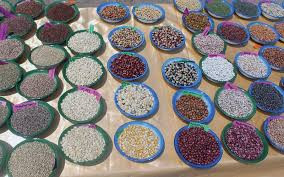
ZIMBABWE’S major seed producers have sounded the alarm over a new government regulation mandating chemical treatment of all certified maize seed, a move they say could raise prices, undermine food security, and erode gains in agricultural productivity.
The regulation, introduced under Statutory Instrument 61 of 2025 and gazetted by the Ministry of Lands, Agriculture, Fisheries, Water and Rural Development, requires all certified maize seed to be treated with a combination of diamide and neonicotinoid pesticides to combat the fall armyworm (FAW).
Authorities say the measure is vital to counter the invasive pest that has wreaked havoc on crops across sub-Saharan Africa.
But industry leaders are warning of far-reaching consequences if the government does not reconsider or delay implementation. Stakeholders are actively engaging in discussions to lobby the government to review or suspend the directive.
In separate interviews with the Zimbabwe Independent, seed industry players expressed deep concern over what they described as a rushed and opaque policy rollout that could destabilise the country’s seed sector and push thousands of farmers out of the formal seed market.
They said there were cost implications to the industry, given the short notice to implementation of this SI.
“Whilst there is need for a solution around army worm, it is important to find a solution that is safe from a health perspective,” one senior official in the seed industry, who asked not to be named, said.
“It must also be within the bounds of reasonable costs. We must take into consideration that the funding is most likely scarce foreign currency.
- Chamisa under fire over US$120K donation
- Mavhunga puts DeMbare into Chibuku quarterfinals
- Pension funds bet on Cabora Bassa oilfields
- Councils defy govt fire tender directive
Keep Reading
“It will definitely be a challenge to secure suppliers offering competitive prices.”
Industry estimates show the mandatory treatment could cost US$1 000 per metric tonne of seed, an expense that seed producers warn will inevitably be passed on to farmers.
“It is unfortunate that this cost will be passed onto the farmer, which means the seed prices will definitely go up,” another player, who is hopeful that negotiations will yield a positive outcome, said.
“Farmers are already struggling at current prices, so it will make certified seed unaffordable. There is no doubt that this move will have a negative impact on household seed security.
“The government might have to offer grants or subsidies to cover FAW seed dressing associated costs.”
The policy comes at a precarious time for Zimbabwe’s agricultural sector, still reeling from currency volatility, inflation, and chronic input shortages.
Stakeholders say these shocks have already driven up seed prices, now compounded by the pesticide mandate.
Concerns have been raised that current seed prices are already straining farmers, and that the introduction of mandatory FAW seed treatments could further escalate costs, according to sources familiar with the matter.
Experts warn that while the combination of a diamide and a neonicotinoid, as outlined in the statutory instrument, may provide control for up to 28 days, its effectiveness is short-lived. Additional insecticidal interventions may still be required if FAW infestations persist.
While government insists the measure is science-driven and necessary, critics argue it lacks transparency, consultation, and consideration of alternative strategies.
There are lingering questions within the industry about the rationale behind adopting a statutory instrument (SI) for pest control — whether it is grounded in science, local research, business considerations, or ethical concerns.
Some stakeholders are questioning whether this is indeed the most appropriate route.
It has also been noted that FAW is neither the first nor the last pest to threaten crop production, prompting concerns over whether every future pest outbreak will be addressed through similar legislative instruments.
Given the short implementation window, seed company top officials said they would have no time to independently verify the efficacy or safety of the chemicals.
The question they have raised is who will bear the health risks.
Environmental advocates and food justice groups have also weighed in.
Darlington Mafa, climate justice lead at the Food Justice Network, called for a pause and a more transparent policy process.
“The fall armyworm is indeed a living nightmare for both smallholder and commercial farmers alike,” Mafa said.
“That is public knowledge. Any solution around it would benefit from effective communication to the affected constituency before making concrete policy changes.
“Questions that now emerge on the amendment are: is there substantive research data on these chemicals as a viable solution from trials and tests?
“Will this not push seed production costs upwards and further strain smallholder, beginning and commercial farmers through increased seed prices?”
Zimbabwe’s foreign exchange shortages mean chemical imports will likely strain already fragile supply chains, raising doubts about whether seed producers can comply in time for the next planting season. Mafa also pointed to the growing public unease over chemical residues in food and warned against undermining public trust.
“There seems to be an omission here in this regard and it affects the food we will be eating soon,” he said.
Repeated attempts to obtain official comment from Agriculture ministry permanent secretary Obert Jiri were unsuccessful.
“Please send your questions via WhatsApp. If I’m not responding, I’m busy,” he said.
With time running out before the new farming season begins, seed producers and farming groups are urgently calling on the government to suspend or stagger implementation of the regulation until clear guidelines, adequate support mechanisms, and thorough stakeholder consultations are in place. Failure to act, they warn, could reverse hard-won progress in national food production, and deepen the vulnerability of Zimbabwe’s most at-risk farmers.











